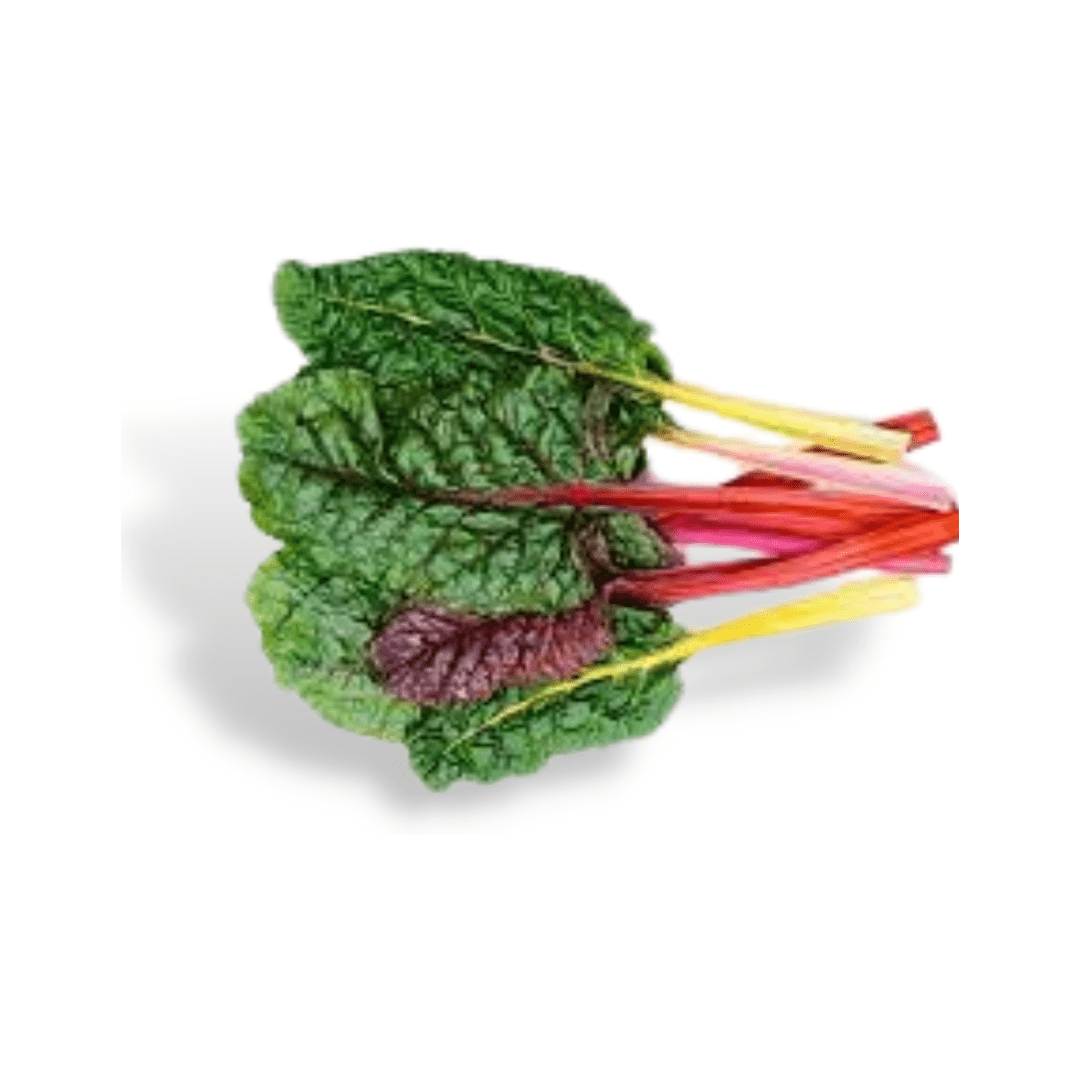About
Swiss chard, also known as silverbeet or simply chard, is a leafy green vegetable that is popular in Mediterranean cuisine. It is a member of the beet family and is closely related to spinach. Swiss chard has large, crisp leaves and a slightly bitter flavor. It is available in a variety of colors, including green, red, and rainbow.
Health Benefits:
Swiss chard is a highly nutritious vegetable that is low in calories and high in fiber, vitamins, and minerals. Some of the health benefits associated with Swiss chard include:
- Helps maintain healthy blood pressure
- Promotes healthy digestion
- Supports bone health
- Boosts immunity
- Supports healthy vision
- Helps prevent anemia
- Reduces inflammation
- Supports healthy weight loss
Diseases that can be cured: Swiss chard has not been shown to cure any specific diseases. However, its high nutrient content and health benefits make it a valuable addition to a healthy diet that may help prevent certain diseases.
Energy and Macronutrient Content per 50-gram serving of Swiss chard:
| Nutrient | Amount |
|---|---|
| Calories | 7 |
| Carbohydrates | 1.4 g |
| Protein | 0.8 g |
| Fat | 0.1 g |
| Fiber | 1.6 g |
| Water | 46 g |
Vitamin Content per 50-gram serving of Swiss chard:
| Vitamin | Amount |
|---|---|
| Vitamin A | 764 IU |
| Vitamin B1 | 0.03 mg |
| Vitamin B2 | 0.05 mg |
| Vitamin B3 | 0.3 mg |
| Vitamin B6 | 0.04 mg |
| Vitamin B12 | 0 mcg |
| Vitamin C | 12 mg |
| Vitamin D | 0 IU |
| Vitamin E | 0.26 mg |
| Vitamin K | 300 mcg |
| Folate | 14 mcg |
| Biotin | 1 mcg |
Mineral Content per 50 gram serving of Swiss chard:
| Mineral | Amount |
|---|---|
| Calcium | 51 mg |
| Iron | 0.9 mg |
| Iodine | 1 mcg |
| Zinc | 0.2 mg |
| Magnesium | 29 mg |
| Phosphorus | 17 mg |
| Potassium | 213 mg |
| Sodium | 86 mg |
| Chloride | 113 mg |
| Copper | 0.06 mg |
| Chromium | 0 mcg |
| Fluoride | 2 mcg |
| Molybdenum | 8 mcg |
| Manganese | 0.14 mg |
| Selenium | 0.2 mcg |
What are the health benefits of Swiss chard?
Swiss chard is packed with vitamins, minerals, and antioxidants that promote healthy digestion, support bone health, and boost the immune system.
How to cook Swiss chard in various dishes?
Swiss chard can be sautéed, steamed, added to soups or stews, used in stir-fries, or enjoyed raw in salads.
Can Swiss chard be used in salads?
Absolutely! Swiss chard leaves can be a nutritious addition to salads, providing a unique texture and flavor.
How to incorporate Swiss chard in a healthy diet?
You can incorporate Swiss chard in your diet by adding it to smoothies, soups, omelets, or as a side dish with your main meals.
What nutrients are found in Swiss chard?
Swiss chard is rich in vitamins A, C, K, as well as minerals like iron, magnesium, and potassium.
What are the culinary uses of Swiss chard?
Swiss chard can be used in a variety of dishes such as pasta, risotto, wraps, casseroles, or even as a pizza topping.
How to grow Swiss chard in a garden?
Swiss chard is relatively easy to grow in a garden. It prefers well-drained soil and can be sown directly or started indoors and transplanted.
What are the different varieties of Swiss chard?
Swiss chard comes in different varieties with colorful stems such as rainbow chard, red chard, or white-stemmed chard.
Are there any unique cooking techniques for Swiss chard?
Swiss chard can be blanched, braised, or wilted to achieve different textures and flavors.
Where can I buy fresh Swiss chard?
Fresh Swiss chard can be found at farmers' markets, local grocery stores, or through community-supported agriculture (CSA) programs.
What are the farm-to-table benefits of Swiss chard?
By supporting local farmers and consuming fresh Swiss chard, you contribute to sustainable agriculture and enjoy produce at its peak freshness.
How to store Swiss chard for maximum freshness?
Remove any rubber bands or ties, wrap Swiss chard in a damp paper towel, and store it in a plastic bag in the refrigerator.
Can Swiss chard be frozen for later use?
Yes, blanch Swiss chard briefly, cool it down, and freeze it in airtight containers or freezer bags for future use.
What are the nutritional differences between Swiss chard and other leafy greens?
Swiss chard is higher in vitamins A and K compared to spinach or kale, making it a nutritious choice for a well-rounded diet.
Are there any specific Swiss chard dishes in different cuisines?
Swiss chard is commonly used in Mediterranean, Italian, and Middle Eastern cuisines in dishes like spanakopita, pasta primavera, or stuffed Swiss chard rolls.
How does Swiss chard contribute to a balanced diet?
Swiss chard is low in calories, high in fiber, and provides essential nutrients, making it a valuable component of a balanced diet.









